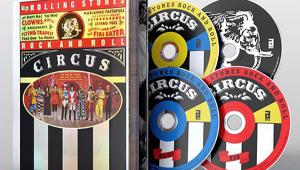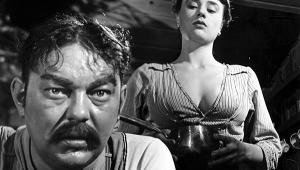DVD Review: Inland Empire Page 2

To the degree that Inland has a plot, it goes something like this: As in Mulholland Dr., a blonde actress's identity splits, causing her to tumble from affluence to squalor. And, as in Mulholland, filmmaking and Hollywood are somehow to blame. But unlike in the earlier movie, where a lesbian relationship seemed to trigger the heroine's downfall, here the actress (Laura Dern) has a more conventional affair with a co-star (Justin Theroux), causing her life to go to hell.
Beyond that, you can forget about Lynch offering any kind of a hand. He has stripped everything down to its dreamy essence here, so there are few of the cornball gags that ground some of his earlier works to a halt. (We should all be grateful he never got to make One Saliva Bubble.) Instead, there's one harsh, unrelenting, sometimes annoying, sometimes edifying, and more often than not emotionally draining set piece after another. Whatever it is that's bugging David, he wants us to feel its full, crushing force, even while offering only the barest of clues as to what the problem is.
It's a story as old as American culture itself: An iconic entertainer, more astute and adept than the run-of-the-mill popmeisters, veers toward a harsher and harsher vision as his youthful illusions fade away. And as Lynch has gotten older, his films have indeed become bleaker, less frivolous, driven by a tragic impulse whose full articulation seems to lie just beyond his grasp. This in turn has led to more and more opaque and labyrinthine images, structures, and emotional interplay. (Inland bears more than a passing resemblance to Herman Melville's infamously bitter, elaborate, and elusive Confidence Man.)
That's not to say Inland isn't entertaining, because it does offer ample rewards for anyone looking for something more nourishing than the usual cinematic pabulum. There are some breathtakingly witty moments along the way - like when a Madonna glimpsed in a ketchup stain turns out to be the opening scene's "lost girl" (Karolina Gruszka) playing Gloria Swanson playing Queen Kelly, the titular character of the film-within-the-film that Swanson, as Norma Desmond, watches in Sunset Blvd. (Lynch's debt to the still trenchant cynicism of Billy Wilder's masterpiece is apparent throughout both Mulholland and Inland. One of the deleted scenes on the Inland DVD opens, in black and white, with Dern's "assassin" [Julia Ormond] walking past the Alto Nido apartments - the seedy abode of Sunset sucker extraordinaire Joe Gillis.)
Even headier is the finale's hommage to Stanley Kubrick, and The Shining in particular. One wild moment has the wounded Dern aping the mad Jack Torrance lurching to his doom in the snow-covered maze, with the blurred succession of his son's footprints becoming the stars on Hollywood's Walk of Fame, as Krzysztof Penderecki's now-familiar music crashes and roars in the background. (Lest these references to Kubrick seem to anyone forced, consider that he and Federico Fellini are the only two filmmakers given their own chapters in Lynch's book, Catching the Big Fish. And Kubrick is the only filmmaker Lynch talks about in the "Stories" section of the DVD's extras.)
- Log in or register to post comments






























































